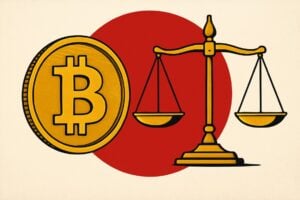In a rapidly evolving global context, Japan is preparing to introduce a profound revision of cryptocurrency regulations. The Financial Services Agency (FSA) is considering the reclassification of cryptocurrencies as “financial products” to strengthen the fight against insider trading and increase transparency in the sector. The reform, expected by 2026, is part of a strategic plan to offer greater guarantees to investors and markets.
Regulation of cryptocurrencies in Japan: the FSA’s plan
The Japanese Financial Services Agency has initiated work on a substantial amendment to the regulatory treatment of cryptocurrencies. Currently considered as simple payment instruments under the Payment Services Act, cryptocurrencies could be reclassified as true financial products, falling under the discipline of the Financial Instruments and Exchange Act (FIEA).
The declared objective is to fill the legal gaps that prevent effective oversight of illicit activities, particularly the improper use of insider information – one of the most insidious and difficult phenomena to monitor in a rapidly evolving sector such as that of digital currencies.
Limits of the current regulations
Under the current regulations, the digital assets in Japan are regulated as means of payment, which significantly limits the ability of the authorities to apply the standards reserved for traditional financial markets. In particular:
- The Payment Services Act does not include comprehensive mechanisms against insider trading;
- The authorities cannot require the same level of transparency and compliance of transactions typical of regulated markets;
- The requirements for comunicazione di informazioni sensibili o rilevanti are weaker compared to those imposed on listed companies.
The FSA has found that this classification is now outdated and no longer adequate for the level of sophistication reached by the crypto market.
Objectives of the legislative review
With the new approach, the intent of the legislator is twofold:
- Strengthen investor protection by introducing rules similar to those in force for stocks or other financial instruments;
- Allow authorities to act effectively against misconduct or fraudulent behavior, such as market manipulation and unauthorized use of confidential information.
According to internal government sources, the proposal will take shape based on the recommendations of a group of legal-financial experts convened to analyze the impact of the current legislative shortcomings.
Parliamentary process and expected timelines
The FSA plans to present the proposal for amendment to the National Diet by 2026, following the definition of the technical framework and consultation with the interested parties. The planned phases will be:
1. Draft of the amendments to the Financial Instruments and Exchange Act;
2. Public consultations and stakeholder engagement with industry operators;
3. Official presentation of the draft law;
4. Discussion and parliamentary approval.
As of today, operational details are not available, such as the characteristics that will define “informazione privilegiata” in the context of digital assets or the administrative or criminal sanctions provided for violations.
A market in transformation: challenges and opportunities
The market of cryptocurrencies in Japan has experienced strong expansion, fueled by both startups and institutional investors. However, the growth has not been without incidents. Cases of fraud, cyber attacks, and poor operational transparency have highlighted systemic issues.
A new regulation would allow:
- The application of structured control mechanisms, such as mandatory audits, financial disclosure, and order traceability;
- The adoption of stricter standards by exchanges, which would find themselves operating in a regime similar to that of regulated stock exchanges;
- The enhancement of the role of institutional investors, who would be more inclined to operate in a more predictable context.
International comparison: towards a regulatory convergence?
The Japanese initiative is part of a broader movement affecting many of the major economies. In the United States, the Securities and Exchange Commission (SEC) has long expressed the intention to treat many cryptocurrencies as “securities.” In the European Union, the MiCA (Markets in Crypto-Assets) regulation defines new regulatory categories, aiming to fill the same gaps that Japan is now addressing.
This prompts reflection on a possible global regulatory convergence, which could lead G7 and G20 countries to recognize common standards on transparency, anti-money laundering prevention, and protection against manipulative practices.
Implications for industry operators
For the exchanges operating in Japan, the reform will imply a significant regulatory realignment:
- They will need to adjust their internal control and compliance systems;
- They might be required to register as financial intermediaries or authorized brokers;
- They should develop automated systems for detecting anomalies and suspicious access to confidential information.
At the same time, greater regulation could represent a strategic lever to attrarre investimenti and reassure users about the reliability of the system.
A necessary change for a more mature market
The decision of Japan to reassess the legal classification of cryptocurrencies marks a fundamental step towards the maturation of the crypto sector in one of the most advanced economies in the world. On one hand, there is the risk of excessive bureaucratization, but on the other, a clear and detailed regulation represents the main tool for building a climate of trust and responsibility.
The path is still long and will require a balance between investor protection, innovation incentives, and global competitiveness. However, the commitment of the FSA clearly signals that Japan is determined to lead the international debate on the regulation of new digital markets.
In 2026 we might not only see new regulations, but also a new global standard for how States interact with the universe of cryptocurrencies.


